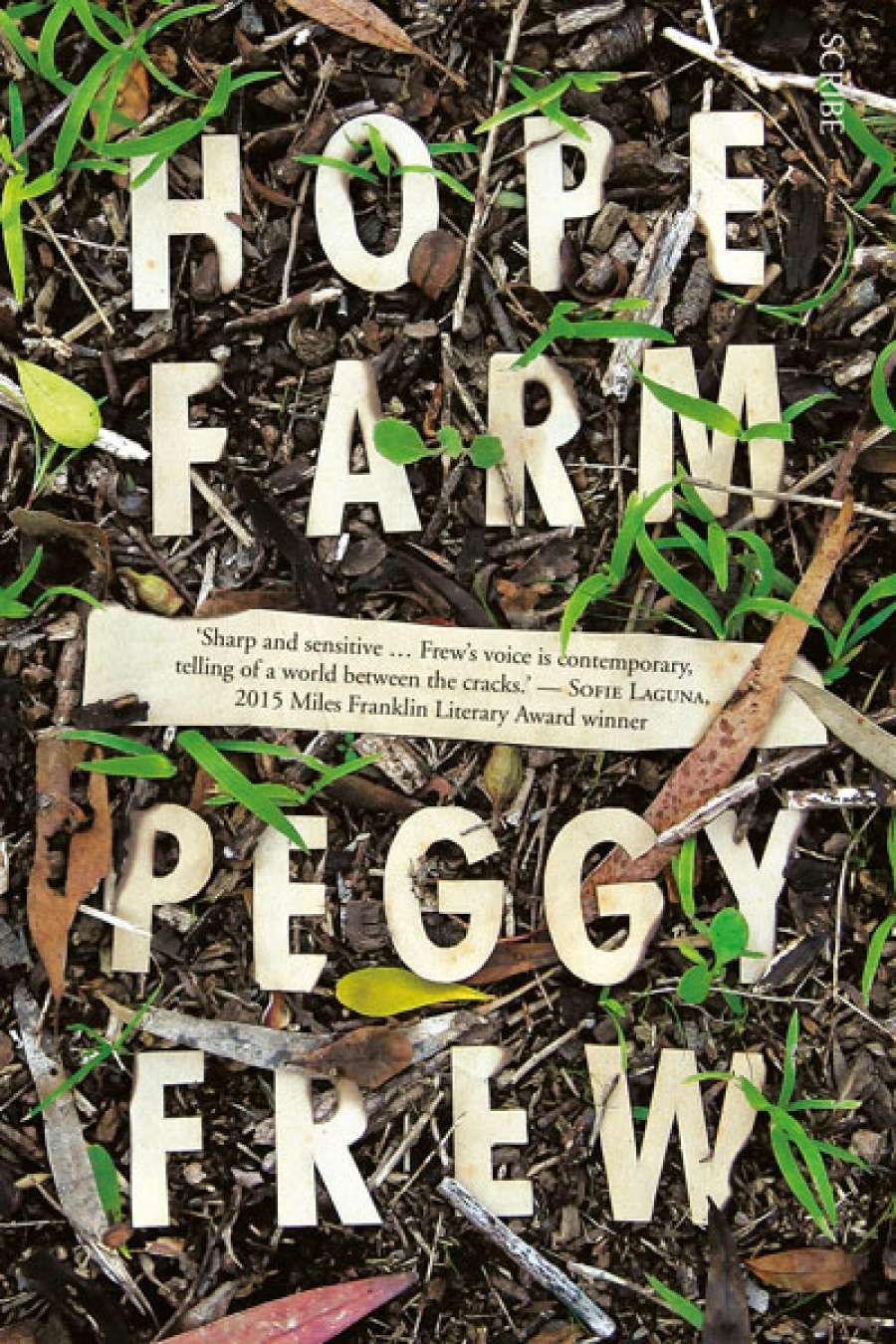
- Free Article: No
- Contents Category: Fiction
- Custom Article Title: Patrick Allington reviews 'Hope Farm' by Peggy Frew
- Book 1 Title: Hope Farm
- Book 1 Biblio: Scribe, $29.99 pb, 352 pp, 9781925106572
Hope Farm's principal narrator is Silver. Writing from the distance of adulthood, she mediates – but only occasionally dismisses or patronises – her childhood self. Silver tells her story in sad but inquisitive fashion, giving the impression that she has mulled at length the machinations of her childhood and the events she has endured. Frew does a solid job of avoiding making Silver a prematurely wise child, although she is hyper-observant: 'He was an egg-shaped man with only a few wisps of white-grey hair, and he always wore the same formless beige trousers and a red jumper with a small flag of untucked shirt showing at the bottom.' Occasionally, the themes and ideas that underpin the novel, particularly those related to the reliability of constructed or shifting memories, intrude too explicitly on the story. More often, though, Silver's narration is insightful and frank.
Certain passages written by Ishtar disrupt Silver's tense reminiscences. Ishtar's short, sharp offerings are riveting. Determined to commit her story to the page, she pushes past limited literacy to explain herself with piercing clarity and excruciating honesty, even when seemingly justifying herself. Some of the most startling passages in Hope Farm come via Ishtar's voice: 'Then she said to me You go straight back to the hospital now, its not too late. No I said, Im not going to do that Ive made my decision. My mother was quiet I could hear her breathing then she hung up the phone.'
Eventually, Ishtar and Silver end up – the latter now aged thirteen – living among a motley group of hippies at Hope Farm in rural Victoria. Here Ishtar is in a relationship of sorts with Miller, a wannabe self-sufficiency guru who can barely wield a hammer and who does not know the right time of year to plant potatoes. His delusions of grandeur and lack of insight are fully evident in the ideological rants that he delivers to people who have heard it all before: 'their ideals had seized up and grown heavy somehow, and they didn't know how to put them down.' Miller is an indistinct figure at times, but that is mainly because Silver (the girl) prefers it that way. While the other inhabitants of Hope Farm are hardly impressive, Frew avoids demonising them or rendering them as walking clichés. When it truly matters, some of them are capable of pulling themselves together.
'Although it is set in the 1970s and 1980s, the novel's focus on counter-culture gives it an unfixed, ethereal quality'
From the opening pages, but especially after Ishtar and Silver arrive at Hope Farm, the story carries a sense of impending doom. Silver's narration makes it clear that things will not end well, causing despondency to creep across the pages like a vine. Two new arrivals at Hope Farm accelerate the sense of crisis: Dan, a young musician who is keen on Ishtar, and Dawn, Miller's apparently mentally ill wife.
Nonetheless, Silver's life has moments of light and solace. At Hope Farm she forms a friendship with Ian, her young neighbour. They spend hours in the bush together, offering each other simple companionship as well as mutual solidarity for their respective woes (Ian is the victim of a relentless schoolyard bully). Frew captures quite beautifully their bond, not least its growing complexity and its fissures.
 Peggy Frew
Peggy Frew
Ishtar and Silver's relationship is even more absorbing, not least because it is hard to pin down. Silver adores her mother but wants more. She bemoans Ishtar's choices, especially the choice of Miller, and is acutely aware of the impact Ishtar can have on people: she possesses a magnetism that goes beyond her physical beauty. Ishtar is a mix of courageous and confounded. She carries herself resolutely while staggering under the weight of the many layers of her life, including her choice to keep Silver. The acuteness of some of the mother–daughter exchanges is excruciating.
At times through the book's plump middle, the story sags or the details of the hippy lifestyle become somewhat didactic. In the main, though, the measured way that Frew unfolds the story – as if time slightly stretches and slows – helps capture the reality of Silver's long days and nights. The climax, when it comes, is explosive but not overblown. I found the tying up of many loose ends unnecessary and intrusive, but some readers will welcome knowing these extra details. Either way, Hope Farm is a novel distinctive for its exploration of humanity and of doing things differently.


Comments powered by CComment